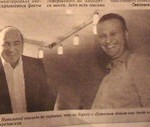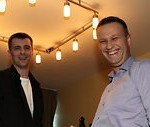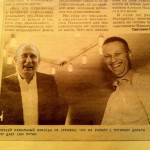Alexander Litvinenko, Targeted by a Breadcrumb Trail of Deadly Radiation
Agency Update: Some weeks after I wrote and published the post below, I licensed Amy Knight’s book to the Thomas Dunne Books imprint at St Martin’s Press. The manuscript is already being edited and the book, ORDERS FROM ABOVE: The Putin Regime and Political Murder, will be published in September 2017.
—
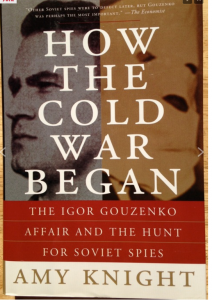 One of my author clients as a literary agent is a historian and scholar named Amy Knight. In 2006, when I was working as an acquiring editor at Carroll & Graf, I published her fifth book, How the Cold War Began: The Igor Gouzenko Affair and the Hunt for Soviet Spies, on the Soviet cypher clerk, Ghouzenko, who in September 1945 became arguably the first defector of the Cold War; he ultimately found asylum in Canada, and would later appear in media there disguised as he’s shown on the cover of the edition we brought out. I was amazed that this episode had occurred even while WWII was still ongoing. From Knight’s website, I note that she “earned her PhD in Russian politics at the London School of Economics and Political Science (LSE) in 1977….She’s taught at the LSE, Johns Hopkins, SAIS, and Carleton University in Ottawa, Canada and also worked for eighteen years at the U.S. Library of Congress as a Soviet/Russian affairs specialist. In 1993-94, she was a fellow at the Woodrow Wilson International Center for Scholars. Knight has written over 30 scholarly articles and has contributed numerous pieces on Russian politics and history to the New York Review of Books and the Times Literary Supplement. Her articles have also been published in the New York Times, the Washington Post, and The Wilson Quarterly.” She speaks Russian, and is especially knowledgable on the Russian security services, a veritable alphabet soup of state authorities that Putin has emphatically turned to his purposes since becoming Russian president in 1999.
One of my author clients as a literary agent is a historian and scholar named Amy Knight. In 2006, when I was working as an acquiring editor at Carroll & Graf, I published her fifth book, How the Cold War Began: The Igor Gouzenko Affair and the Hunt for Soviet Spies, on the Soviet cypher clerk, Ghouzenko, who in September 1945 became arguably the first defector of the Cold War; he ultimately found asylum in Canada, and would later appear in media there disguised as he’s shown on the cover of the edition we brought out. I was amazed that this episode had occurred even while WWII was still ongoing. From Knight’s website, I note that she “earned her PhD in Russian politics at the London School of Economics and Political Science (LSE) in 1977….She’s taught at the LSE, Johns Hopkins, SAIS, and Carleton University in Ottawa, Canada and also worked for eighteen years at the U.S. Library of Congress as a Soviet/Russian affairs specialist. In 1993-94, she was a fellow at the Woodrow Wilson International Center for Scholars. Knight has written over 30 scholarly articles and has contributed numerous pieces on Russian politics and history to the New York Review of Books and the Times Literary Supplement. Her articles have also been published in the New York Times, the Washington Post, and The Wilson Quarterly.” She speaks Russian, and is especially knowledgable on the Russian security services, a veritable alphabet soup of state authorities that Putin has emphatically turned to his purposes since becoming Russian president in 1999.
Titled Orders from Above: The Putin Regime and Political Murder, her new book promises to be the definitive account of the Kremlin’s lethal targeting of opponents inside Russia and in the West during the Putin years. A key part of it will chronicle in riveting tick-tock detail the 2006 murder-by-radiation of Alexander Litvinenko, who during the early part of his career was a member of the Russian security services, though by 1998 was a critic Russia’s security service devoted to counter-intelligence, organized crime, and anti-terrorism, the FSB. He had been in prison twice, for supposed insubordination. In 1999, terror struck in Moscow, when a whole apartment block was bombed, killing more than 300 people. The government quickly blamed it on Chechen insurgents, charging that the rebels, still smarting from their loss of the war in Chechnya earlier that decade were bent on revenge against ordinary Russians. But critics, including Litvinenko, believed the crime had emerged from within the regime, an atrocity committed to confirm a sort of bogeyman population in Russia’s midst, an internal enemy they could blame for many wrongs in the society. In 2000, after being released from prison a second time, he fled the country with his wife and son, eventually finding asylum in London where he found succor from another Putin critic, Boris Berezovsky, for whom he worked while continuing to agitate against Putin’s rule. In November 2006, he was poisoned with polonium-2010-laced green tea during a midday meeting with his clumsy assassins, who left a breadcrumb trail of radioactive contamination all over London, even on the airplane they’d boarded in Russia.
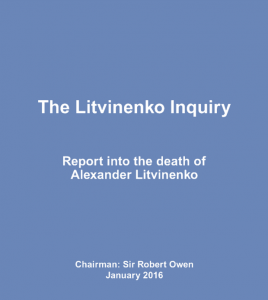 This morning in London, the British government released its official report on the death of Litvninenko, an inquiry long sought by his widow Marina. The magistrate, Sir Robert Owen, announced the findings to a tribunal where Knight was in attendance, on assignment from NY Review of Books editor Robert Silvers for the NYRB blog. As reported by the BBC and the NY Times, Owen accused “Andrei K. Lugovoi, a former KGB bodyguard, and Dmitri V. Kovtun, a Red Army deserter,” of poisoning Litvinenko at the Pine Bar in London’s Millennium Hotel on Nov 1, 2006. What’s more he laid the planning of the murder on the doorstep of the FSB, while concluding in careful, lawyerly language that Putin himself is “probably” responsible for Litvinenko’s ghastly death. When Knight posts her own report on the Inquiry, I’ll share the blog here.
This morning in London, the British government released its official report on the death of Litvninenko, an inquiry long sought by his widow Marina. The magistrate, Sir Robert Owen, announced the findings to a tribunal where Knight was in attendance, on assignment from NY Review of Books editor Robert Silvers for the NYRB blog. As reported by the BBC and the NY Times, Owen accused “Andrei K. Lugovoi, a former KGB bodyguard, and Dmitri V. Kovtun, a Red Army deserter,” of poisoning Litvinenko at the Pine Bar in London’s Millennium Hotel on Nov 1, 2006. What’s more he laid the planning of the murder on the doorstep of the FSB, while concluding in careful, lawyerly language that Putin himself is “probably” responsible for Litvinenko’s ghastly death. When Knight posts her own report on the Inquiry, I’ll share the blog here.
This is just the sort of ripped-from-the-headlines book I always enjoyed working on as an in-house editor, so I’m excited to be working with Amy Knight again, this time from the agent side of the desk.

